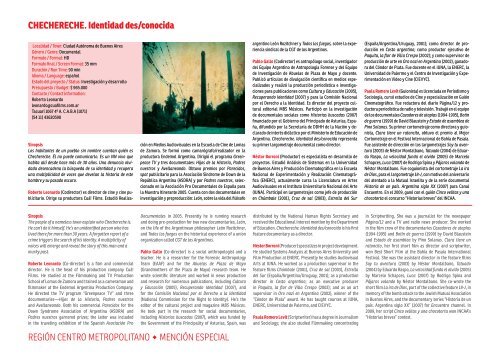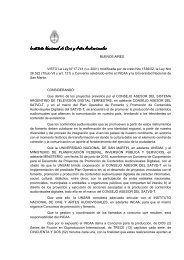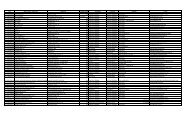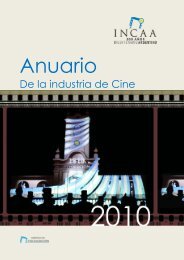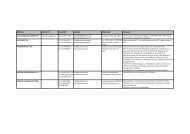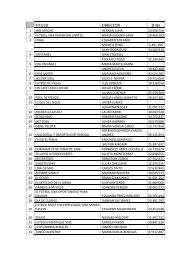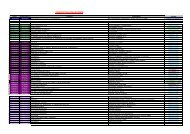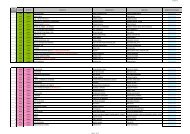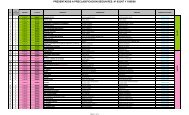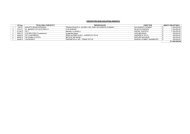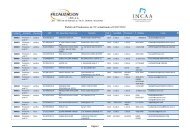Catálogo de proyeCtos seleCCionados 2009 - Incaa
Catálogo de proyeCtos seleCCionados 2009 - Incaa
Catálogo de proyeCtos seleCCionados 2009 - Incaa
Create successful ePaper yourself
Turn your PDF publications into a flip-book with our unique Google optimized e-Paper software.
CHECHERECHE. I<strong>de</strong>ntidad <strong>de</strong>s/conocida<br />
Localidad / Town: Ciudad Autónoma <strong>de</strong> Buenos Aires<br />
Género / Genre: Documental<br />
Formato / Format: HD<br />
Formato final / Screen Format: 35 mm<br />
Duración / Run Time: 90 min<br />
Idioma / Language: español<br />
Estado <strong>de</strong>l proyecto / Status: Investigación y <strong>de</strong>sarrollo<br />
Presupuesto / Budget: $ 965.000<br />
Contacto / Contact information:<br />
Roberto Leonardo<br />
leonardo@cuafilms.com.ar<br />
Tacuarí 1067 4º A. C.A.B.A (1071)<br />
(54 11) 43620590<br />
Sinopsis<br />
Los habitantes <strong>de</strong> un pueblo sin nombre cuentan quién es<br />
Chechereche. Él no pue<strong>de</strong> comunicarlo. Es un NN vivo que<br />
habita allí <strong>de</strong>s<strong>de</strong> hace más <strong>de</strong> 30 años. Una <strong>de</strong>nuncia olvidada<br />
<strong>de</strong>senca<strong>de</strong>na la búsqueda <strong>de</strong> su i<strong>de</strong>ntidad y recupera<br />
una multiplicidad <strong>de</strong> voces que <strong>de</strong>velan la historia <strong>de</strong> este<br />
hombre y su pasado oscuro.<br />
Roberto Leonardo (Codirector) es director <strong>de</strong> cine y cine publicitario.<br />
Dirige su productora Cuá! Films. Estudió Realización<br />
en Medios Audiovisuales en la Escuela <strong>de</strong> Cine <strong>de</strong> Lomas<br />
<strong>de</strong> Zamora. Se formó como camarógrafo/realizador en la<br />
productora En<strong>de</strong>mol Argentina. Dirigió el programa Greenpeace<br />
TV y tres documentales: Hijos <strong>de</strong> la Historia, Padres<br />
nuestros y Avellaneando. Obtuvo premios por Parecidos,<br />
spot publicitario para la Asociación Síndrome <strong>de</strong> Down <strong>de</strong> la<br />
República Argentina (ASDRA) y por Padres nuestros, seleccionado<br />
en la Asociación Pro Documentales <strong>de</strong> España para<br />
la Muestra Itinerante 2005. Cuenta con dos documentales en<br />
investigación y preproducción: León, sobre la vida <strong>de</strong>l filósofo<br />
argentino León Rozitchner y Todos los fuegos, sobre la experiencia<br />
sindical <strong>de</strong> la CGT <strong>de</strong> los Argentinos.<br />
Pablo Gallo (Codirector) es antropólogo social, investigador<br />
<strong>de</strong>l Equipo Argentino <strong>de</strong> Antropología Forense y <strong>de</strong>l Equipo<br />
<strong>de</strong> Investigación <strong>de</strong> Abuelas <strong>de</strong> Plaza <strong>de</strong> Mayo y docente.<br />
Publicó artículos <strong>de</strong> divulgación científica en medios especializados<br />
y realizó la producción periodística e investigaciones<br />
para publicaciones como Cultura y Educación (2005),<br />
Recuperando I<strong>de</strong>ntidad (2007) y para la Comisión Nacional<br />
por el Derecho a la I<strong>de</strong>ntidad. Es director <strong>de</strong>l proyecto cultural<br />
editorial MBS Músicos. Participó en la investigación<br />
<strong>de</strong> documentales sociales como Historias buscadas (2007)<br />
financiado por el Gobierno <strong>de</strong>l Principado <strong>de</strong> Asturias, España,<br />
difundido por la Secretaría <strong>de</strong> DDHH <strong>de</strong> la Nación y <strong>de</strong>clarado<br />
<strong>de</strong> interés didáctico por el Ministerio <strong>de</strong> Educación <strong>de</strong><br />
Argentina. Chechereche. I<strong>de</strong>ntidad <strong>de</strong>s/conocida representa<br />
su primer largometraje documental como director.<br />
Néstor Borroni (Productor) es especialista en <strong>de</strong>sarrollo <strong>de</strong><br />
proyectos. Estudió Análisis <strong>de</strong> Sistemas en la Universidad<br />
<strong>de</strong> Buenos Aires y Producción Cinematográfica en la Escuela<br />
Nacional <strong>de</strong> Experimentación y Realización Cinematográfica<br />
(ENERC), actualmente cursa la Licenciatura en Artes<br />
Audiovisuales en el Instituto Universitario Nacional <strong>de</strong>l Arte<br />
(IUNA). Participó en largometrajes como jefe <strong>de</strong> producción<br />
en Chúmbale (2001), Cruz <strong>de</strong> sal (2003), Estrella <strong>de</strong>l Sur<br />
(España/Argentina/Uruguay, 2001); como director <strong>de</strong> producción<br />
en Costo argentino; como productor ejecutivo <strong>de</strong><br />
Paquita, la flor <strong>de</strong> Villa Crespo (2002); y como supervisor <strong>de</strong><br />
producción <strong>de</strong> arte en Oro nazi en Argentina (2002), ganadora<br />
<strong>de</strong>l Cóndor <strong>de</strong> Plata. Fue docente en el IUNA, la ENERC, la<br />
Universidad <strong>de</strong> Palermo y el Centro <strong>de</strong> Investigación y Experimentación<br />
en Vi<strong>de</strong>o y Cine (CIEVYC).<br />
Paula Romero Levit (Guionista) es licenciada en Periodismo y<br />
Sociología, cursó estudios <strong>de</strong> Cine y especialización en Guión<br />
Cinematográfico. Fue redactora <strong>de</strong>l diario Página/12 y productora<br />
periodística <strong>de</strong> radio y televisión. Trabajó en el equipo<br />
<strong>de</strong> los documentales Cazadores <strong>de</strong> utopías (1994-1995), Botín<br />
<strong>de</strong> guerra (1999) <strong>de</strong> David Blaustein y Estado <strong>de</strong> asamblea <strong>de</strong><br />
Pino Solanas. Su primer cortometraje como directora y guionista,<br />
Clara tiene un ratoncito, obtuvo el premio al Mejor<br />
Cortometraje en el Festival Internacional <strong>de</strong> Bahía <strong>de</strong> Pasaia.<br />
Fue asistente <strong>de</strong> dirección en los largometrajes Soy tu aventura<br />
(2003) <strong>de</strong> Néstor Montalbano, Tatuado (2004) <strong>de</strong> Eduardo<br />
Raspo, La velocidad funda el olvido (2005) <strong>de</strong> Marcelo<br />
Schapces, Luca (2007) <strong>de</strong> Rodrigo Spina y Pájaros volando <strong>de</strong><br />
Néstor Montalbano. Fue coguionista <strong>de</strong>l cortometraje La ira<br />
<strong>de</strong> Dios, para el largometraje 18-J, con motivo <strong>de</strong>l aniversario<br />
<strong>de</strong>l atentado a la Mutual Israelita y <strong>de</strong> la serie documental<br />
Historia <strong>de</strong> un país. Argentina siglo XX (2007) para Canal<br />
Encuentro. En el <strong>2009</strong>, ganó con el guión Cinco velitas y una<br />
chocotorta el concurso “Historias breves” <strong>de</strong>l INCAA.<br />
Sinopsis<br />
The people of a nameless town explain who Chechereche is.<br />
He can’t do it himself. He’s an uni<strong>de</strong>ntified person who has<br />
lived there for more than 30 years. A forgotten report of a<br />
crime triggers the search of his i<strong>de</strong>ntity. A multiplicity of<br />
voices will emerge and reveal the story of this man and a<br />
murky past.<br />
Roberto Leonardo (Co-director) is a film and commercial<br />
director. He is the head of his production company Cuá!<br />
Films. He studied at the Filmmaking and TV Production<br />
School of Lomas <strong>de</strong> Zamora and trained as a cameraman and<br />
filmmaker at the En<strong>de</strong>mol Argentina Production Company.<br />
He directed the TV program “Greenpeace TV” and three<br />
documentaries—Hijos <strong>de</strong> la Historia, Padres nuestros<br />
and Avellaneando. Both his commercial Parecidos for the<br />
Down Syndrome Association of Argentina (ASDRA) and<br />
Padres nuestros garnered prizes; the latter was inclu<strong>de</strong>d<br />
in the traveling exhibition of the Spanish Asociación Pro<br />
Documentales in 2005. Presently he is running research<br />
and doing pre-production for two new documentaries, León,<br />
on the life of the Argentinean philosopher León Rozitchner,<br />
and Todos los fuegos on the historical experience of a union<br />
organization called CGT <strong>de</strong> los Argentinos.<br />
Pablo Gallo (Co-director) is a social anthropologist and a<br />
teacher. He is a researcher for the Forensic Anthropology<br />
Team (EAAF) and for the Abuelas <strong>de</strong> Plaza <strong>de</strong> Mayo<br />
(Grandmothers of the Plaza <strong>de</strong> Mayo) research team. He<br />
wrote scientific literature and worked in news production<br />
and research for numerous publications, including Cultura<br />
y Educación (2005), Recuperando I<strong>de</strong>ntidad (2007), and<br />
for the Comisión Nacional por el Derecho a la I<strong>de</strong>ntidad<br />
(National Commission for the Right to I<strong>de</strong>ntity). He’s the<br />
editor of the cultural project and magazine MBS Músicos.<br />
He took part in the research for social documentaries,<br />
including Historias buscadas (2007), which was fun<strong>de</strong>d by<br />
the Government of the Principality of Asturias, Spain, was<br />
REGIÓN Centro metropolitano r mención especial<br />
distributed by the National Human Rights Secretary and<br />
received the Educational Interest mention by the Department<br />
of Education. Chechereche. I<strong>de</strong>ntidad <strong>de</strong>s/conocida is his first<br />
feature documentary as a director.<br />
Néstor Borroni (Producer) specializes in project <strong>de</strong>velopment.<br />
He studied Systems Analysis at Buenos Aires University and<br />
Film Production at ENERC. Presently he studies Audiovisual<br />
Arts at IUNA. He worked as a production supervisor in the<br />
feature films Chúmbale (2001), Cruz <strong>de</strong> sal (2003), Estrella<br />
<strong>de</strong>l Sur (España/Argentina/Uruguay, 2001); as a production<br />
director in Costo argentino; as an executive producer<br />
in Paquita, la flor <strong>de</strong> Villa Crespo (2002); and as an art<br />
supervisor in Oro nazi en Argentina (2002), winner of the<br />
“Cóndor <strong>de</strong> Plata” award. He has taught courses at IUNA,<br />
ENERC, Universidad <strong>de</strong> Palermo, and CIEVYC.<br />
Paula Romero Levit (Scriptwriter) has a <strong>de</strong>gree in Journalism<br />
and Sociology; she also studied Filmmaking concentrating<br />
in Scriptwriting. She was a journalist for the newspaper<br />
Página/12 and a TV and radio news producer. She worked<br />
in the film crew of the documentaries Cazadores <strong>de</strong> utopías<br />
(1994-1995) and Botín <strong>de</strong> guerra (1999) by David Blaustein<br />
and Estado <strong>de</strong> asamblea by Pino Solanas. Clara tiene un<br />
ratoncito, her first short film as director and scriptwriter,<br />
won Best Short Film at the Bahía <strong>de</strong> Pasaia International<br />
Festival. She was the assistant director in the feature films<br />
Soy tu aventura (2003) by Néstor Montalbano, Tatuado<br />
(2004) by Eduardo Raspo, La velocidad funda el olvido (2005)<br />
by Marcelo Schapces, Luca (2007) by Rodrigo Spina and<br />
Pájaros volando by Néstor Montalbano. She co-wrote the<br />
short film La ira <strong>de</strong> Dios, part of the collective feature 18-J, in<br />
memory of the bomb attack to the Jewish Mutual Association<br />
in Buenos Aires, and the documentary series “Historia <strong>de</strong> un<br />
país. Argentina siglo XX” (2007) for Encuentro channel. In<br />
<strong>2009</strong>, her script Cinco velitas y una chocotorta won INCAA’s<br />
“Historias breves” contest.


